Sociology Report: Cultural Competency and Sports Therapy in Australia
VerifiedAdded on 2023/03/17
|9
|2489
|86
Report
AI Summary
This report delves into the crucial topic of cultural competency within the field of sports therapy, examining its relevance and application within the NSW Bachelor of Sport and Exercise Science Health Service. The paper highlights the author's qualifications as a sports therapist and their suitability as a cultural liaison, emphasizing their understanding of social determinants, human rights, and the importance of inclusive practices. It outlines how the author will support and enact the five key constructs of cultural competency: cultural awareness, knowledge, skill, encounters, and desire. Furthermore, the report demonstrates an understanding of professional guidelines, policies related to cultural safety, and the identification of barriers and facilitators to culturally safe and competent professional practice, addressing issues such as miscommunication, racism, and stereotypes. The author showcases their knowledge of health theory to justify their position and emphasizes the importance of cultural competence, cultural safety, and health theory in their role. References are provided to support the arguments made within the report.
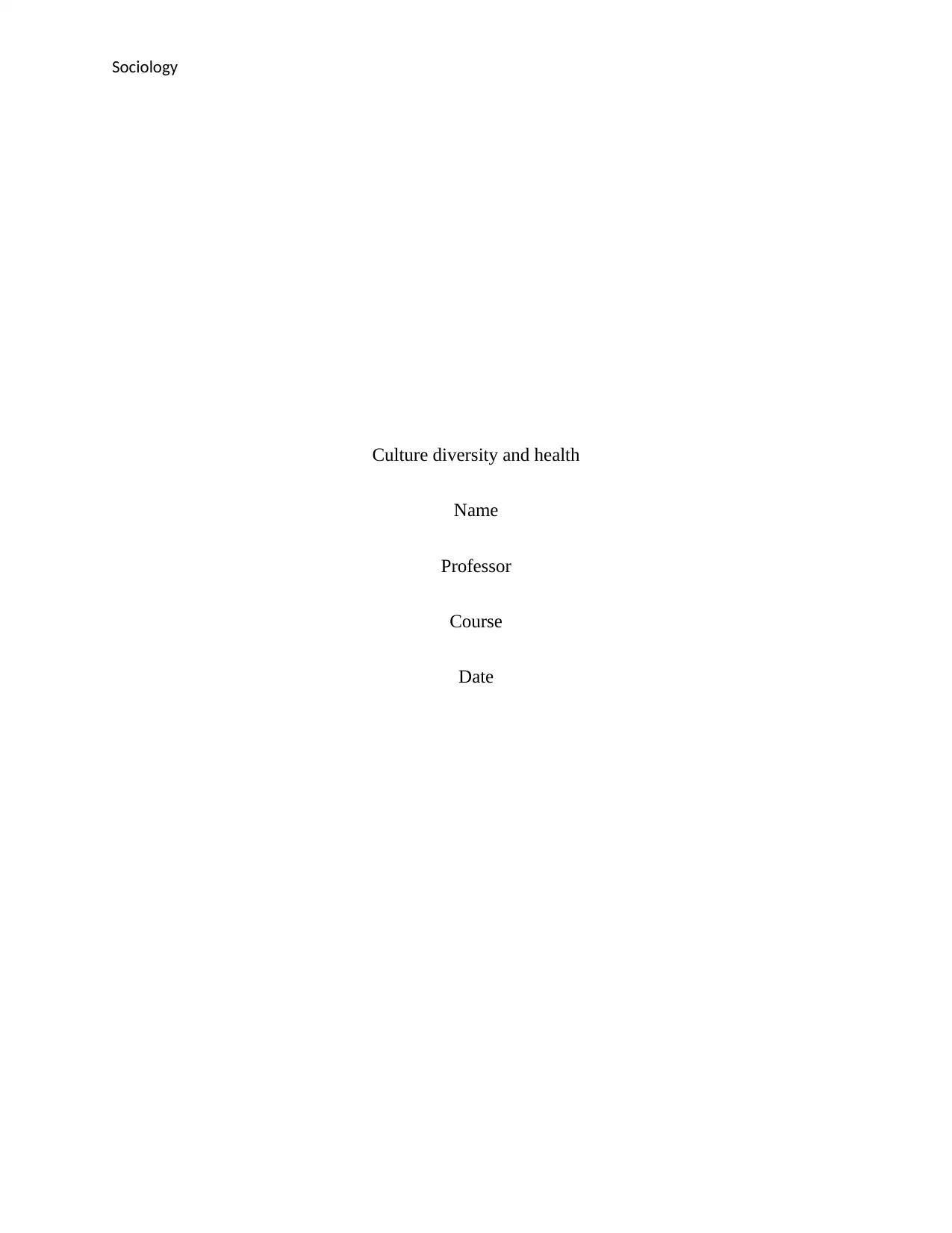
Sociology
Culture diversity and health
Name
Professor
Course
Date
Culture diversity and health
Name
Professor
Course
Date
Paraphrase This Document
Need a fresh take? Get an instant paraphrase of this document with our AI Paraphraser
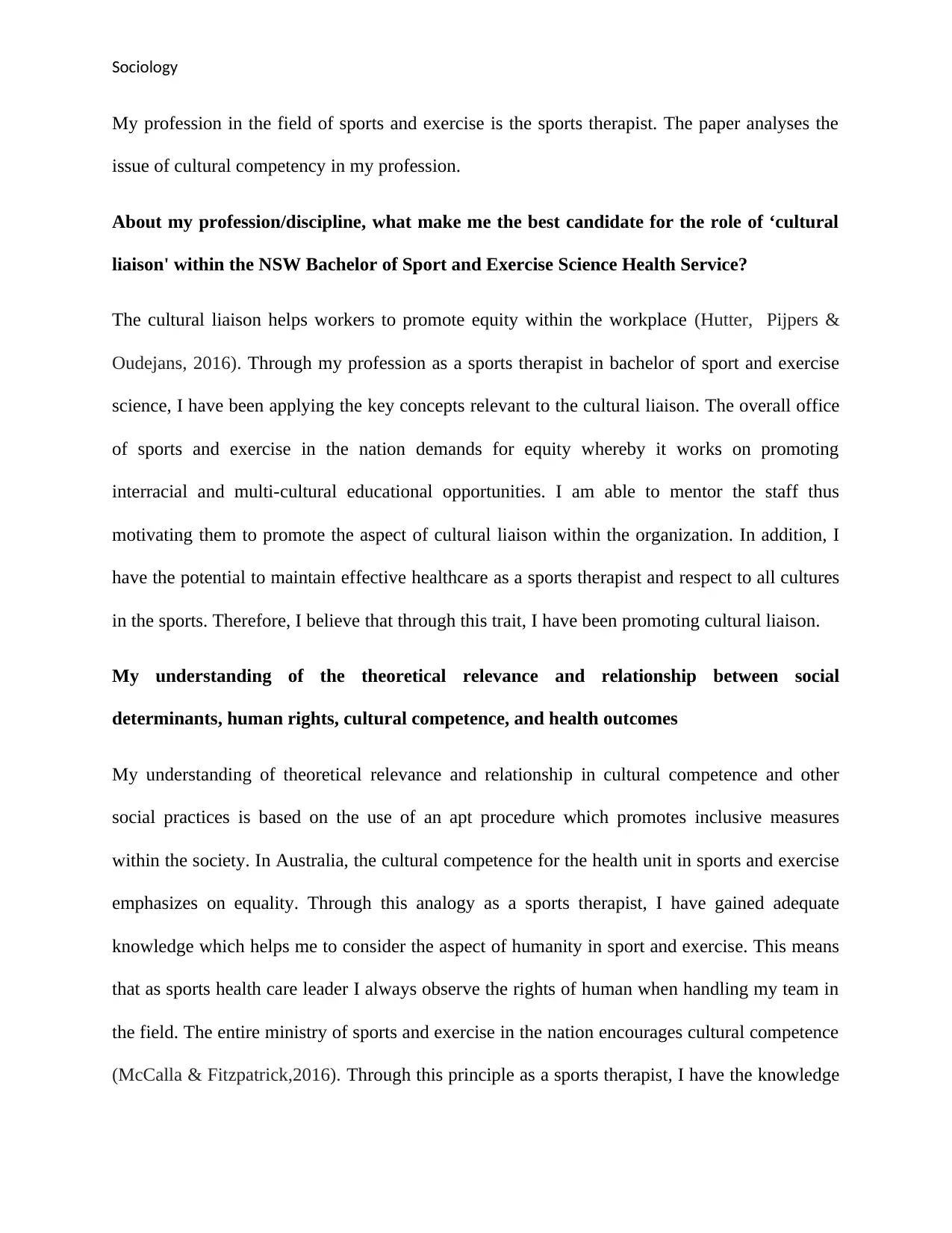
Sociology
My profession in the field of sports and exercise is the sports therapist. The paper analyses the
issue of cultural competency in my profession.
About my profession/discipline, what make me the best candidate for the role of ‘cultural
liaison' within the NSW Bachelor of Sport and Exercise Science Health Service?
The cultural liaison helps workers to promote equity within the workplace (Hutter, Pijpers &
Oudejans, 2016). Through my profession as a sports therapist in bachelor of sport and exercise
science, I have been applying the key concepts relevant to the cultural liaison. The overall office
of sports and exercise in the nation demands for equity whereby it works on promoting
interracial and multi-cultural educational opportunities. I am able to mentor the staff thus
motivating them to promote the aspect of cultural liaison within the organization. In addition, I
have the potential to maintain effective healthcare as a sports therapist and respect to all cultures
in the sports. Therefore, I believe that through this trait, I have been promoting cultural liaison.
My understanding of the theoretical relevance and relationship between social
determinants, human rights, cultural competence, and health outcomes
My understanding of theoretical relevance and relationship in cultural competence and other
social practices is based on the use of an apt procedure which promotes inclusive measures
within the society. In Australia, the cultural competence for the health unit in sports and exercise
emphasizes on equality. Through this analogy as a sports therapist, I have gained adequate
knowledge which helps me to consider the aspect of humanity in sport and exercise. This means
that as sports health care leader I always observe the rights of human when handling my team in
the field. The entire ministry of sports and exercise in the nation encourages cultural competence
(McCalla & Fitzpatrick,2016). Through this principle as a sports therapist, I have the knowledge
My profession in the field of sports and exercise is the sports therapist. The paper analyses the
issue of cultural competency in my profession.
About my profession/discipline, what make me the best candidate for the role of ‘cultural
liaison' within the NSW Bachelor of Sport and Exercise Science Health Service?
The cultural liaison helps workers to promote equity within the workplace (Hutter, Pijpers &
Oudejans, 2016). Through my profession as a sports therapist in bachelor of sport and exercise
science, I have been applying the key concepts relevant to the cultural liaison. The overall office
of sports and exercise in the nation demands for equity whereby it works on promoting
interracial and multi-cultural educational opportunities. I am able to mentor the staff thus
motivating them to promote the aspect of cultural liaison within the organization. In addition, I
have the potential to maintain effective healthcare as a sports therapist and respect to all cultures
in the sports. Therefore, I believe that through this trait, I have been promoting cultural liaison.
My understanding of the theoretical relevance and relationship between social
determinants, human rights, cultural competence, and health outcomes
My understanding of theoretical relevance and relationship in cultural competence and other
social practices is based on the use of an apt procedure which promotes inclusive measures
within the society. In Australia, the cultural competence for the health unit in sports and exercise
emphasizes on equality. Through this analogy as a sports therapist, I have gained adequate
knowledge which helps me to consider the aspect of humanity in sport and exercise. This means
that as sports health care leader I always observe the rights of human when handling my team in
the field. The entire ministry of sports and exercise in the nation encourages cultural competence
(McCalla & Fitzpatrick,2016). Through this principle as a sports therapist, I have the knowledge
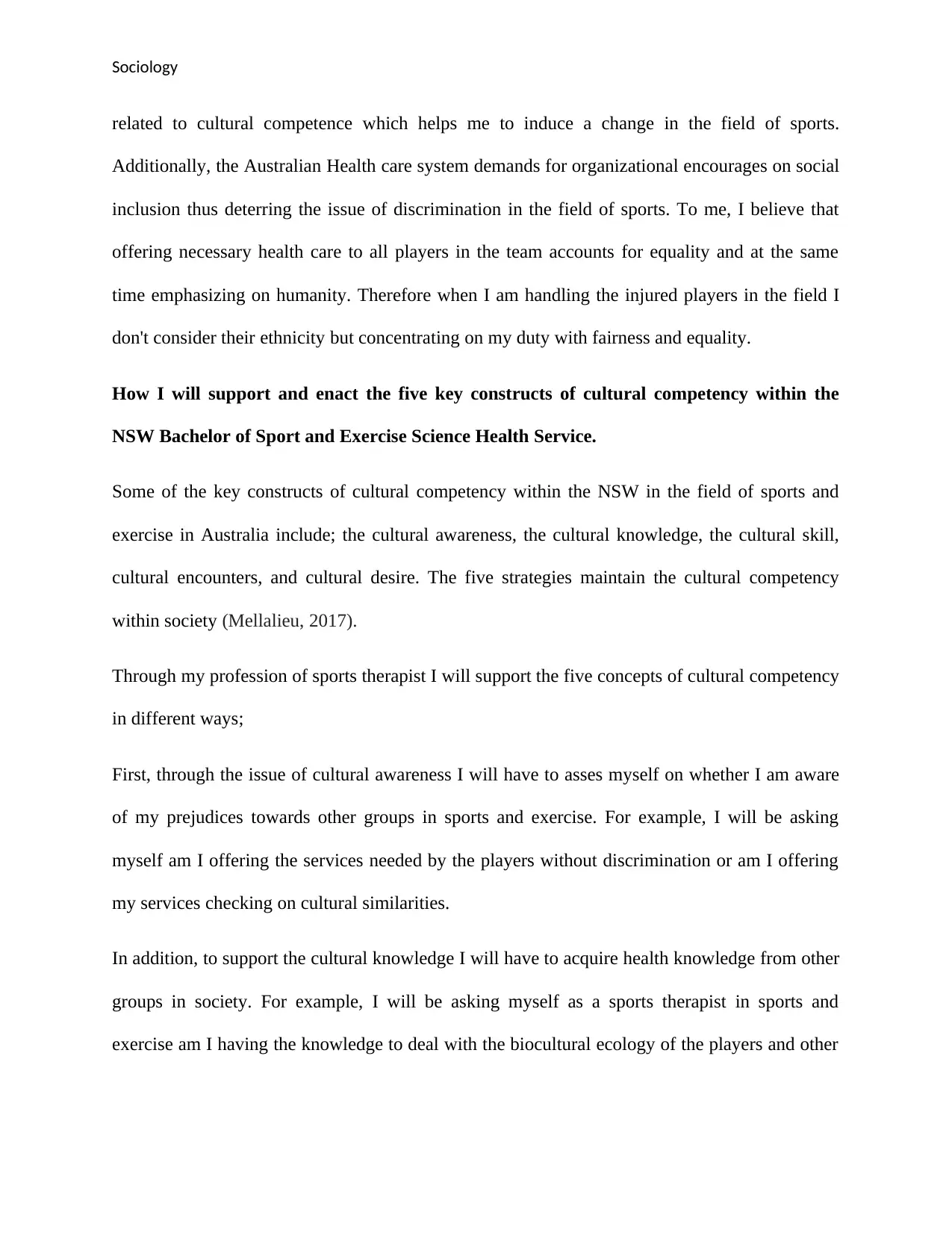
Sociology
related to cultural competence which helps me to induce a change in the field of sports.
Additionally, the Australian Health care system demands for organizational encourages on social
inclusion thus deterring the issue of discrimination in the field of sports. To me, I believe that
offering necessary health care to all players in the team accounts for equality and at the same
time emphasizing on humanity. Therefore when I am handling the injured players in the field I
don't consider their ethnicity but concentrating on my duty with fairness and equality.
How I will support and enact the five key constructs of cultural competency within the
NSW Bachelor of Sport and Exercise Science Health Service.
Some of the key constructs of cultural competency within the NSW in the field of sports and
exercise in Australia include; the cultural awareness, the cultural knowledge, the cultural skill,
cultural encounters, and cultural desire. The five strategies maintain the cultural competency
within society (Mellalieu, 2017).
Through my profession of sports therapist I will support the five concepts of cultural competency
in different ways;
First, through the issue of cultural awareness I will have to asses myself on whether I am aware
of my prejudices towards other groups in sports and exercise. For example, I will be asking
myself am I offering the services needed by the players without discrimination or am I offering
my services checking on cultural similarities.
In addition, to support the cultural knowledge I will have to acquire health knowledge from other
groups in society. For example, I will be asking myself as a sports therapist in sports and
exercise am I having the knowledge to deal with the biocultural ecology of the players and other
related to cultural competence which helps me to induce a change in the field of sports.
Additionally, the Australian Health care system demands for organizational encourages on social
inclusion thus deterring the issue of discrimination in the field of sports. To me, I believe that
offering necessary health care to all players in the team accounts for equality and at the same
time emphasizing on humanity. Therefore when I am handling the injured players in the field I
don't consider their ethnicity but concentrating on my duty with fairness and equality.
How I will support and enact the five key constructs of cultural competency within the
NSW Bachelor of Sport and Exercise Science Health Service.
Some of the key constructs of cultural competency within the NSW in the field of sports and
exercise in Australia include; the cultural awareness, the cultural knowledge, the cultural skill,
cultural encounters, and cultural desire. The five strategies maintain the cultural competency
within society (Mellalieu, 2017).
Through my profession of sports therapist I will support the five concepts of cultural competency
in different ways;
First, through the issue of cultural awareness I will have to asses myself on whether I am aware
of my prejudices towards other groups in sports and exercise. For example, I will be asking
myself am I offering the services needed by the players without discrimination or am I offering
my services checking on cultural similarities.
In addition, to support the cultural knowledge I will have to acquire health knowledge from other
groups in society. For example, I will be asking myself as a sports therapist in sports and
exercise am I having the knowledge to deal with the biocultural ecology of the players and other
⊘ This is a preview!⊘
Do you want full access?
Subscribe today to unlock all pages.

Trusted by 1+ million students worldwide
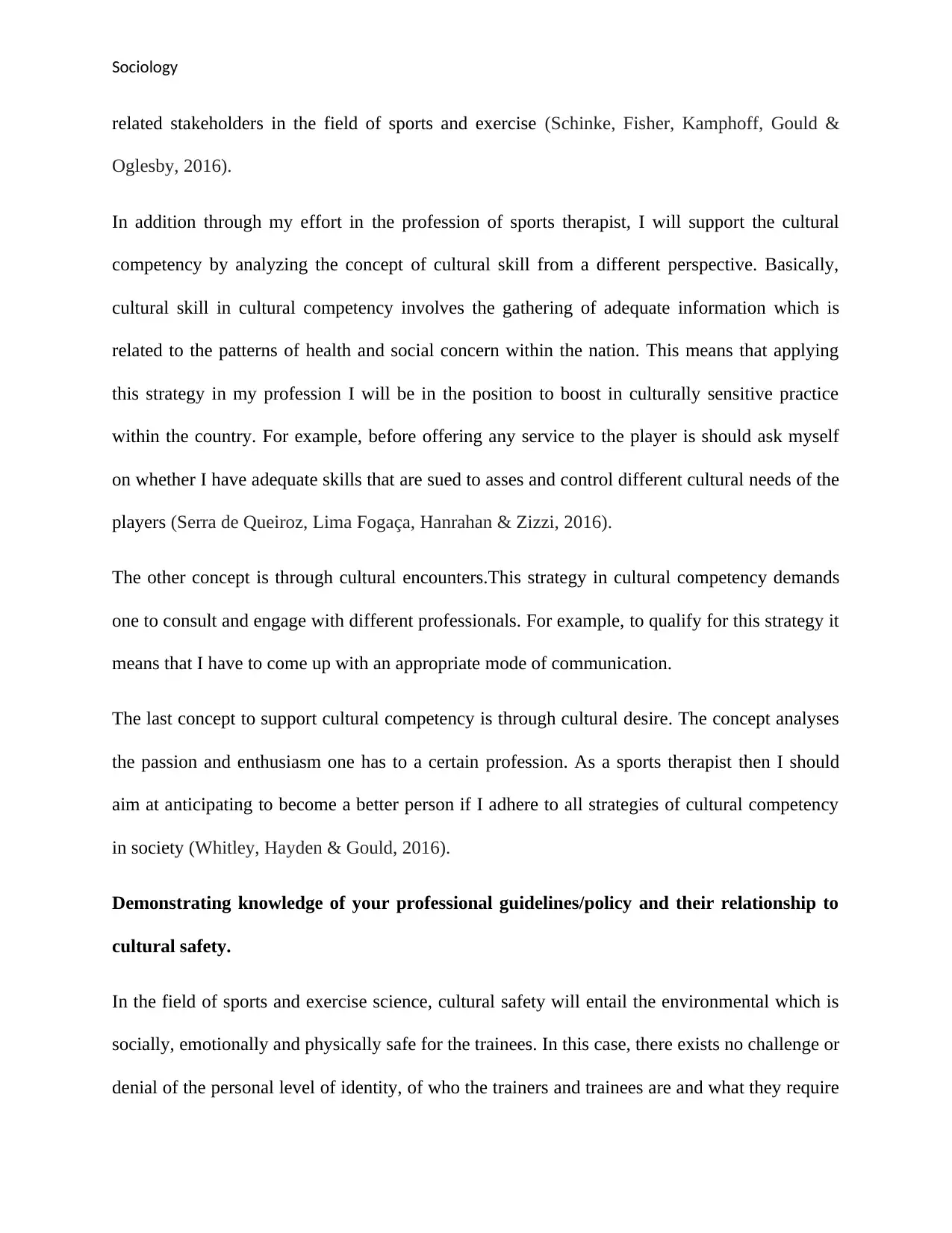
Sociology
related stakeholders in the field of sports and exercise (Schinke, Fisher, Kamphoff, Gould &
Oglesby, 2016).
In addition through my effort in the profession of sports therapist, I will support the cultural
competency by analyzing the concept of cultural skill from a different perspective. Basically,
cultural skill in cultural competency involves the gathering of adequate information which is
related to the patterns of health and social concern within the nation. This means that applying
this strategy in my profession I will be in the position to boost in culturally sensitive practice
within the country. For example, before offering any service to the player is should ask myself
on whether I have adequate skills that are sued to asses and control different cultural needs of the
players (Serra de Queiroz, Lima Fogaça, Hanrahan & Zizzi, 2016).
The other concept is through cultural encounters.This strategy in cultural competency demands
one to consult and engage with different professionals. For example, to qualify for this strategy it
means that I have to come up with an appropriate mode of communication.
The last concept to support cultural competency is through cultural desire. The concept analyses
the passion and enthusiasm one has to a certain profession. As a sports therapist then I should
aim at anticipating to become a better person if I adhere to all strategies of cultural competency
in society (Whitley, Hayden & Gould, 2016).
Demonstrating knowledge of your professional guidelines/policy and their relationship to
cultural safety.
In the field of sports and exercise science, cultural safety will entail the environmental which is
socially, emotionally and physically safe for the trainees. In this case, there exists no challenge or
denial of the personal level of identity, of who the trainers and trainees are and what they require
related stakeholders in the field of sports and exercise (Schinke, Fisher, Kamphoff, Gould &
Oglesby, 2016).
In addition through my effort in the profession of sports therapist, I will support the cultural
competency by analyzing the concept of cultural skill from a different perspective. Basically,
cultural skill in cultural competency involves the gathering of adequate information which is
related to the patterns of health and social concern within the nation. This means that applying
this strategy in my profession I will be in the position to boost in culturally sensitive practice
within the country. For example, before offering any service to the player is should ask myself
on whether I have adequate skills that are sued to asses and control different cultural needs of the
players (Serra de Queiroz, Lima Fogaça, Hanrahan & Zizzi, 2016).
The other concept is through cultural encounters.This strategy in cultural competency demands
one to consult and engage with different professionals. For example, to qualify for this strategy it
means that I have to come up with an appropriate mode of communication.
The last concept to support cultural competency is through cultural desire. The concept analyses
the passion and enthusiasm one has to a certain profession. As a sports therapist then I should
aim at anticipating to become a better person if I adhere to all strategies of cultural competency
in society (Whitley, Hayden & Gould, 2016).
Demonstrating knowledge of your professional guidelines/policy and their relationship to
cultural safety.
In the field of sports and exercise science, cultural safety will entail the environmental which is
socially, emotionally and physically safe for the trainees. In this case, there exists no challenge or
denial of the personal level of identity, of who the trainers and trainees are and what they require
Paraphrase This Document
Need a fresh take? Get an instant paraphrase of this document with our AI Paraphraser
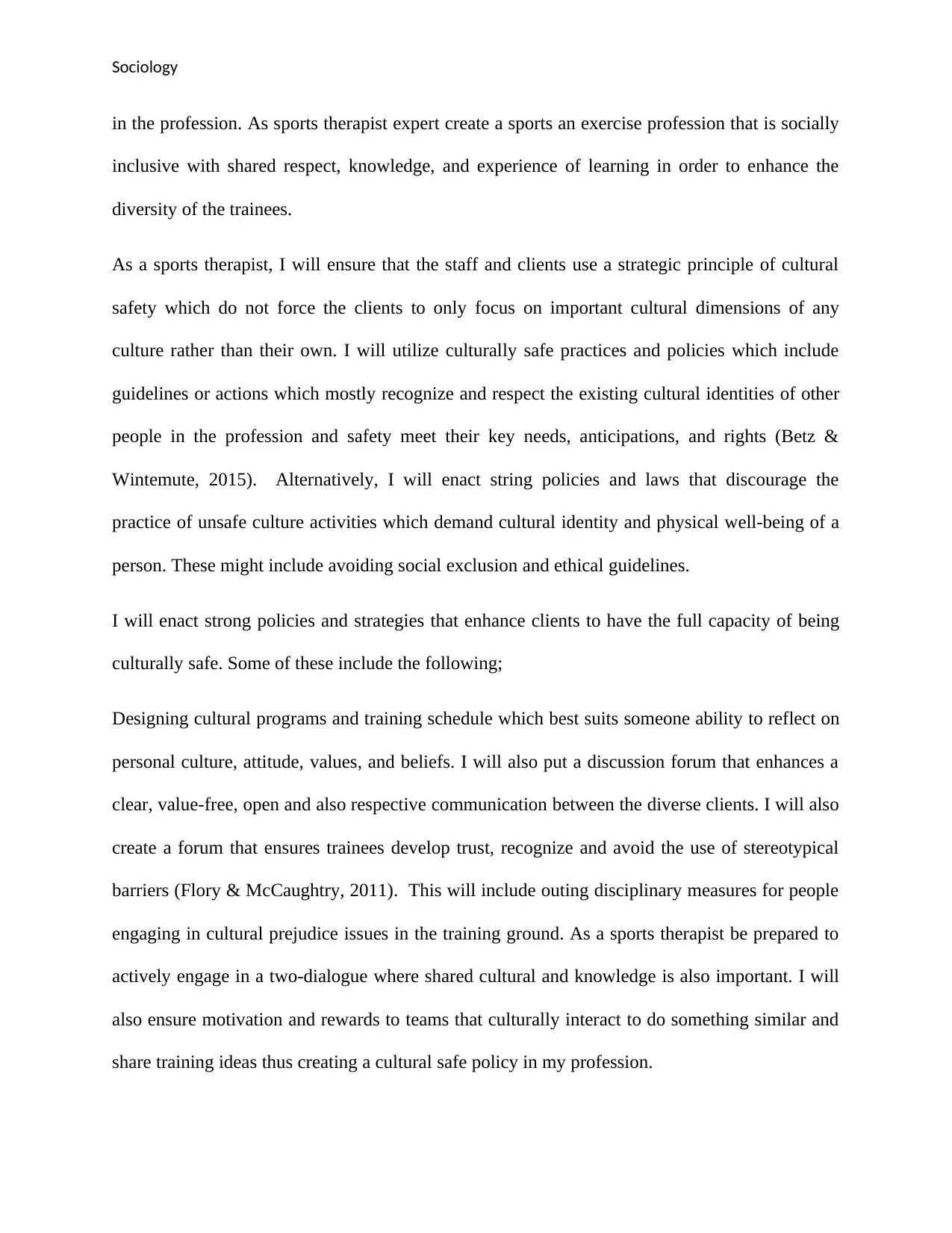
Sociology
in the profession. As sports therapist expert create a sports an exercise profession that is socially
inclusive with shared respect, knowledge, and experience of learning in order to enhance the
diversity of the trainees.
As a sports therapist, I will ensure that the staff and clients use a strategic principle of cultural
safety which do not force the clients to only focus on important cultural dimensions of any
culture rather than their own. I will utilize culturally safe practices and policies which include
guidelines or actions which mostly recognize and respect the existing cultural identities of other
people in the profession and safety meet their key needs, anticipations, and rights (Betz &
Wintemute, 2015). Alternatively, I will enact string policies and laws that discourage the
practice of unsafe culture activities which demand cultural identity and physical well-being of a
person. These might include avoiding social exclusion and ethical guidelines.
I will enact strong policies and strategies that enhance clients to have the full capacity of being
culturally safe. Some of these include the following;
Designing cultural programs and training schedule which best suits someone ability to reflect on
personal culture, attitude, values, and beliefs. I will also put a discussion forum that enhances a
clear, value-free, open and also respective communication between the diverse clients. I will also
create a forum that ensures trainees develop trust, recognize and avoid the use of stereotypical
barriers (Flory & McCaughtry, 2011). This will include outing disciplinary measures for people
engaging in cultural prejudice issues in the training ground. As a sports therapist be prepared to
actively engage in a two-dialogue where shared cultural and knowledge is also important. I will
also ensure motivation and rewards to teams that culturally interact to do something similar and
share training ideas thus creating a cultural safe policy in my profession.
in the profession. As sports therapist expert create a sports an exercise profession that is socially
inclusive with shared respect, knowledge, and experience of learning in order to enhance the
diversity of the trainees.
As a sports therapist, I will ensure that the staff and clients use a strategic principle of cultural
safety which do not force the clients to only focus on important cultural dimensions of any
culture rather than their own. I will utilize culturally safe practices and policies which include
guidelines or actions which mostly recognize and respect the existing cultural identities of other
people in the profession and safety meet their key needs, anticipations, and rights (Betz &
Wintemute, 2015). Alternatively, I will enact string policies and laws that discourage the
practice of unsafe culture activities which demand cultural identity and physical well-being of a
person. These might include avoiding social exclusion and ethical guidelines.
I will enact strong policies and strategies that enhance clients to have the full capacity of being
culturally safe. Some of these include the following;
Designing cultural programs and training schedule which best suits someone ability to reflect on
personal culture, attitude, values, and beliefs. I will also put a discussion forum that enhances a
clear, value-free, open and also respective communication between the diverse clients. I will also
create a forum that ensures trainees develop trust, recognize and avoid the use of stereotypical
barriers (Flory & McCaughtry, 2011). This will include outing disciplinary measures for people
engaging in cultural prejudice issues in the training ground. As a sports therapist be prepared to
actively engage in a two-dialogue where shared cultural and knowledge is also important. I will
also ensure motivation and rewards to teams that culturally interact to do something similar and
share training ideas thus creating a cultural safe policy in my profession.
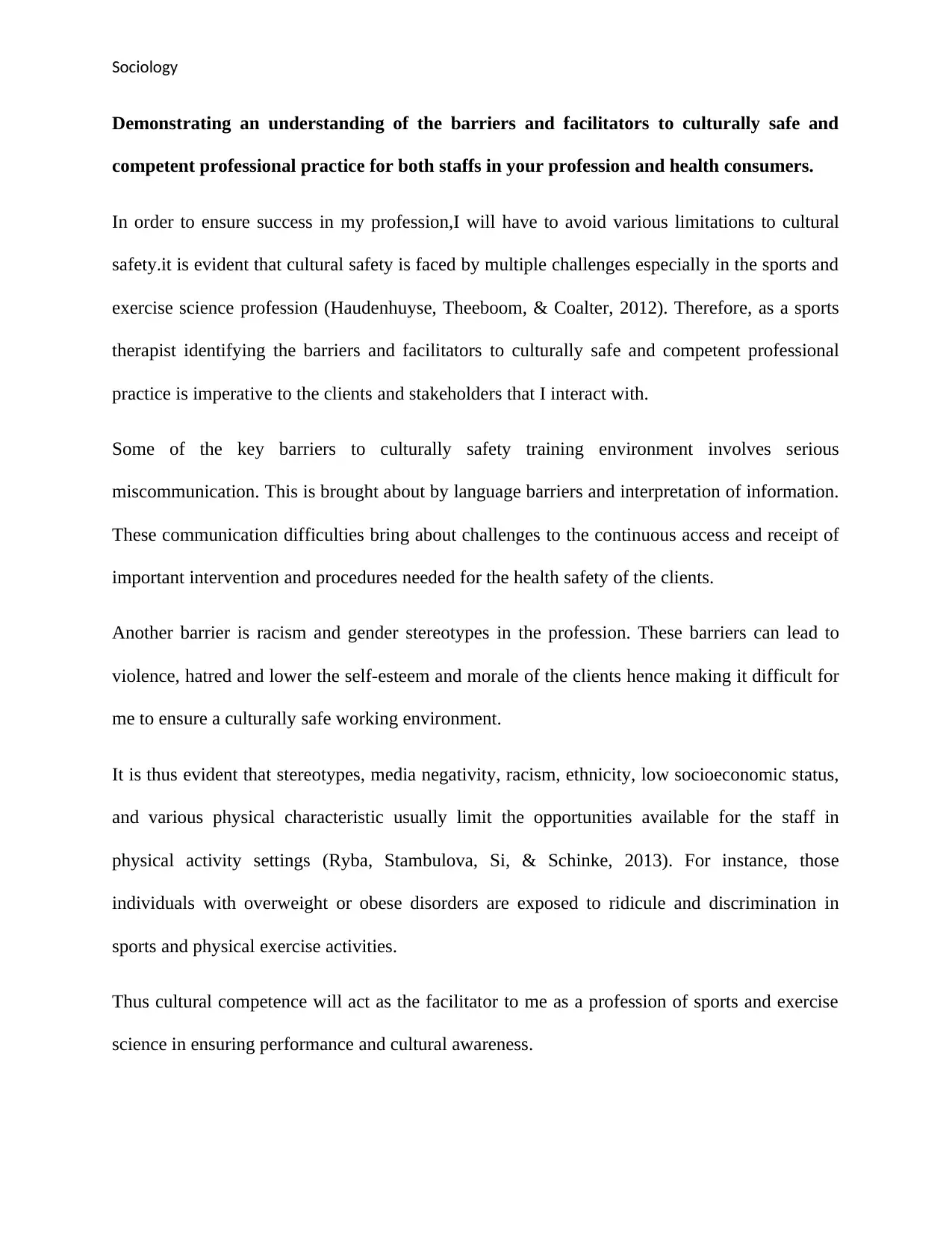
Sociology
Demonstrating an understanding of the barriers and facilitators to culturally safe and
competent professional practice for both staffs in your profession and health consumers.
In order to ensure success in my profession,I will have to avoid various limitations to cultural
safety.it is evident that cultural safety is faced by multiple challenges especially in the sports and
exercise science profession (Haudenhuyse, Theeboom, & Coalter, 2012). Therefore, as a sports
therapist identifying the barriers and facilitators to culturally safe and competent professional
practice is imperative to the clients and stakeholders that I interact with.
Some of the key barriers to culturally safety training environment involves serious
miscommunication. This is brought about by language barriers and interpretation of information.
These communication difficulties bring about challenges to the continuous access and receipt of
important intervention and procedures needed for the health safety of the clients.
Another barrier is racism and gender stereotypes in the profession. These barriers can lead to
violence, hatred and lower the self-esteem and morale of the clients hence making it difficult for
me to ensure a culturally safe working environment.
It is thus evident that stereotypes, media negativity, racism, ethnicity, low socioeconomic status,
and various physical characteristic usually limit the opportunities available for the staff in
physical activity settings (Ryba, Stambulova, Si, & Schinke, 2013). For instance, those
individuals with overweight or obese disorders are exposed to ridicule and discrimination in
sports and physical exercise activities.
Thus cultural competence will act as the facilitator to me as a profession of sports and exercise
science in ensuring performance and cultural awareness.
Demonstrating an understanding of the barriers and facilitators to culturally safe and
competent professional practice for both staffs in your profession and health consumers.
In order to ensure success in my profession,I will have to avoid various limitations to cultural
safety.it is evident that cultural safety is faced by multiple challenges especially in the sports and
exercise science profession (Haudenhuyse, Theeboom, & Coalter, 2012). Therefore, as a sports
therapist identifying the barriers and facilitators to culturally safe and competent professional
practice is imperative to the clients and stakeholders that I interact with.
Some of the key barriers to culturally safety training environment involves serious
miscommunication. This is brought about by language barriers and interpretation of information.
These communication difficulties bring about challenges to the continuous access and receipt of
important intervention and procedures needed for the health safety of the clients.
Another barrier is racism and gender stereotypes in the profession. These barriers can lead to
violence, hatred and lower the self-esteem and morale of the clients hence making it difficult for
me to ensure a culturally safe working environment.
It is thus evident that stereotypes, media negativity, racism, ethnicity, low socioeconomic status,
and various physical characteristic usually limit the opportunities available for the staff in
physical activity settings (Ryba, Stambulova, Si, & Schinke, 2013). For instance, those
individuals with overweight or obese disorders are exposed to ridicule and discrimination in
sports and physical exercise activities.
Thus cultural competence will act as the facilitator to me as a profession of sports and exercise
science in ensuring performance and cultural awareness.
⊘ This is a preview!⊘
Do you want full access?
Subscribe today to unlock all pages.

Trusted by 1+ million students worldwide
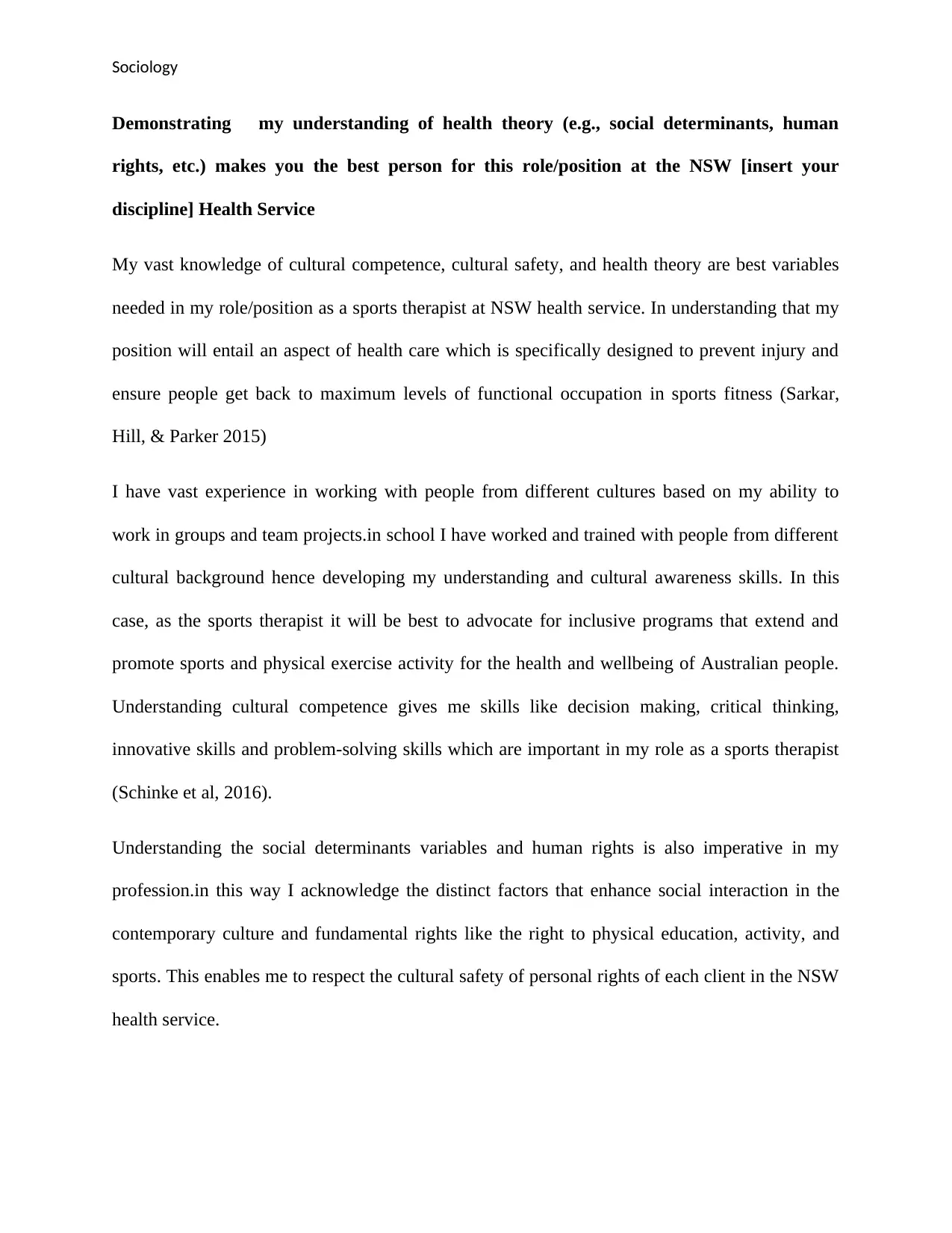
Sociology
Demonstrating my understanding of health theory (e.g., social determinants, human
rights, etc.) makes you the best person for this role/position at the NSW [insert your
discipline] Health Service
My vast knowledge of cultural competence, cultural safety, and health theory are best variables
needed in my role/position as a sports therapist at NSW health service. In understanding that my
position will entail an aspect of health care which is specifically designed to prevent injury and
ensure people get back to maximum levels of functional occupation in sports fitness (Sarkar,
Hill, & Parker 2015)
I have vast experience in working with people from different cultures based on my ability to
work in groups and team projects.in school I have worked and trained with people from different
cultural background hence developing my understanding and cultural awareness skills. In this
case, as the sports therapist it will be best to advocate for inclusive programs that extend and
promote sports and physical exercise activity for the health and wellbeing of Australian people.
Understanding cultural competence gives me skills like decision making, critical thinking,
innovative skills and problem-solving skills which are important in my role as a sports therapist
(Schinke et al, 2016).
Understanding the social determinants variables and human rights is also imperative in my
profession.in this way I acknowledge the distinct factors that enhance social interaction in the
contemporary culture and fundamental rights like the right to physical education, activity, and
sports. This enables me to respect the cultural safety of personal rights of each client in the NSW
health service.
Demonstrating my understanding of health theory (e.g., social determinants, human
rights, etc.) makes you the best person for this role/position at the NSW [insert your
discipline] Health Service
My vast knowledge of cultural competence, cultural safety, and health theory are best variables
needed in my role/position as a sports therapist at NSW health service. In understanding that my
position will entail an aspect of health care which is specifically designed to prevent injury and
ensure people get back to maximum levels of functional occupation in sports fitness (Sarkar,
Hill, & Parker 2015)
I have vast experience in working with people from different cultures based on my ability to
work in groups and team projects.in school I have worked and trained with people from different
cultural background hence developing my understanding and cultural awareness skills. In this
case, as the sports therapist it will be best to advocate for inclusive programs that extend and
promote sports and physical exercise activity for the health and wellbeing of Australian people.
Understanding cultural competence gives me skills like decision making, critical thinking,
innovative skills and problem-solving skills which are important in my role as a sports therapist
(Schinke et al, 2016).
Understanding the social determinants variables and human rights is also imperative in my
profession.in this way I acknowledge the distinct factors that enhance social interaction in the
contemporary culture and fundamental rights like the right to physical education, activity, and
sports. This enables me to respect the cultural safety of personal rights of each client in the NSW
health service.
Paraphrase This Document
Need a fresh take? Get an instant paraphrase of this document with our AI Paraphraser
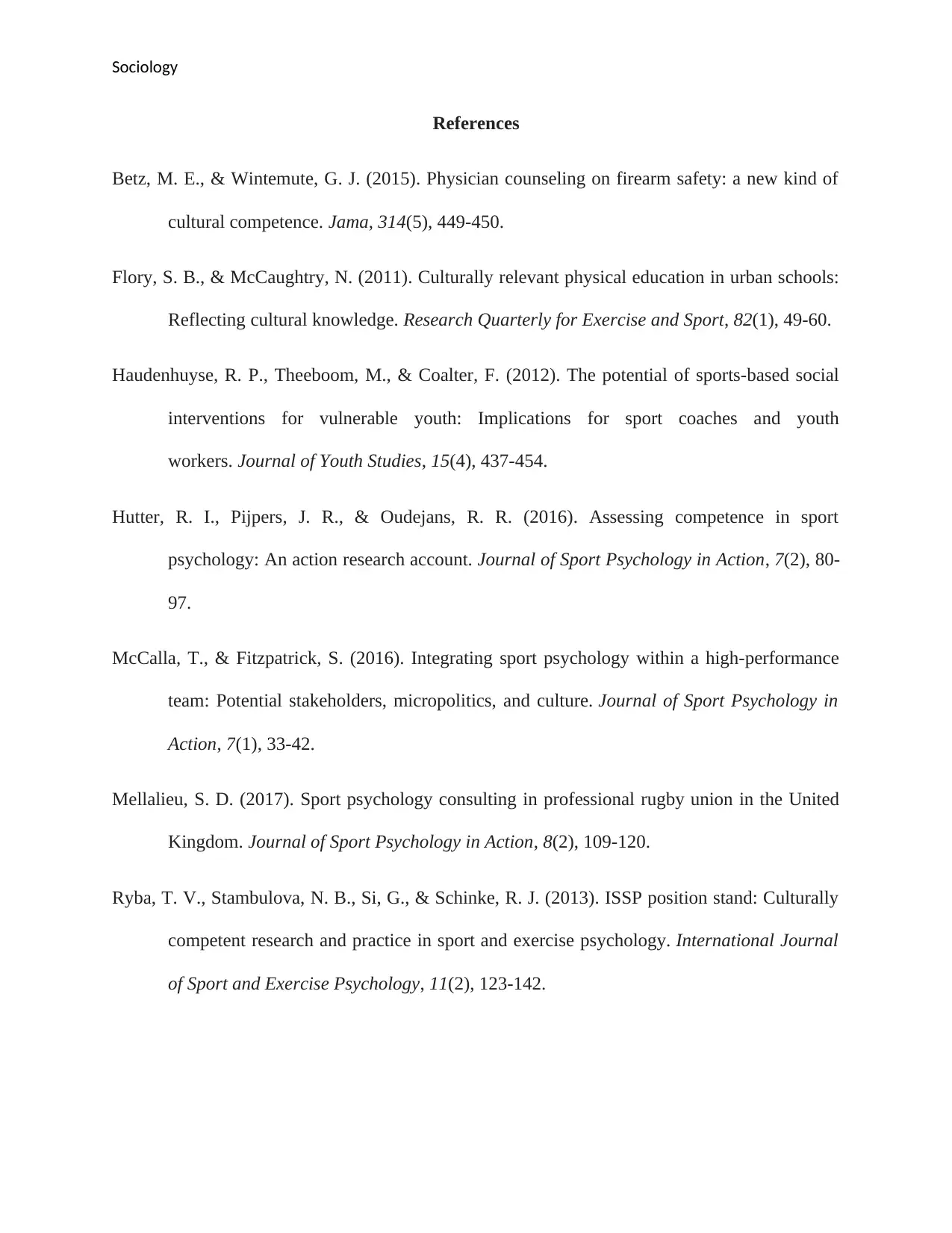
Sociology
References
Betz, M. E., & Wintemute, G. J. (2015). Physician counseling on firearm safety: a new kind of
cultural competence. Jama, 314(5), 449-450.
Flory, S. B., & McCaughtry, N. (2011). Culturally relevant physical education in urban schools:
Reflecting cultural knowledge. Research Quarterly for Exercise and Sport, 82(1), 49-60.
Haudenhuyse, R. P., Theeboom, M., & Coalter, F. (2012). The potential of sports-based social
interventions for vulnerable youth: Implications for sport coaches and youth
workers. Journal of Youth Studies, 15(4), 437-454.
Hutter, R. I., Pijpers, J. R., & Oudejans, R. R. (2016). Assessing competence in sport
psychology: An action research account. Journal of Sport Psychology in Action, 7(2), 80-
97.
McCalla, T., & Fitzpatrick, S. (2016). Integrating sport psychology within a high-performance
team: Potential stakeholders, micropolitics, and culture. Journal of Sport Psychology in
Action, 7(1), 33-42.
Mellalieu, S. D. (2017). Sport psychology consulting in professional rugby union in the United
Kingdom. Journal of Sport Psychology in Action, 8(2), 109-120.
Ryba, T. V., Stambulova, N. B., Si, G., & Schinke, R. J. (2013). ISSP position stand: Culturally
competent research and practice in sport and exercise psychology. International Journal
of Sport and Exercise Psychology, 11(2), 123-142.
References
Betz, M. E., & Wintemute, G. J. (2015). Physician counseling on firearm safety: a new kind of
cultural competence. Jama, 314(5), 449-450.
Flory, S. B., & McCaughtry, N. (2011). Culturally relevant physical education in urban schools:
Reflecting cultural knowledge. Research Quarterly for Exercise and Sport, 82(1), 49-60.
Haudenhuyse, R. P., Theeboom, M., & Coalter, F. (2012). The potential of sports-based social
interventions for vulnerable youth: Implications for sport coaches and youth
workers. Journal of Youth Studies, 15(4), 437-454.
Hutter, R. I., Pijpers, J. R., & Oudejans, R. R. (2016). Assessing competence in sport
psychology: An action research account. Journal of Sport Psychology in Action, 7(2), 80-
97.
McCalla, T., & Fitzpatrick, S. (2016). Integrating sport psychology within a high-performance
team: Potential stakeholders, micropolitics, and culture. Journal of Sport Psychology in
Action, 7(1), 33-42.
Mellalieu, S. D. (2017). Sport psychology consulting in professional rugby union in the United
Kingdom. Journal of Sport Psychology in Action, 8(2), 109-120.
Ryba, T. V., Stambulova, N. B., Si, G., & Schinke, R. J. (2013). ISSP position stand: Culturally
competent research and practice in sport and exercise psychology. International Journal
of Sport and Exercise Psychology, 11(2), 123-142.
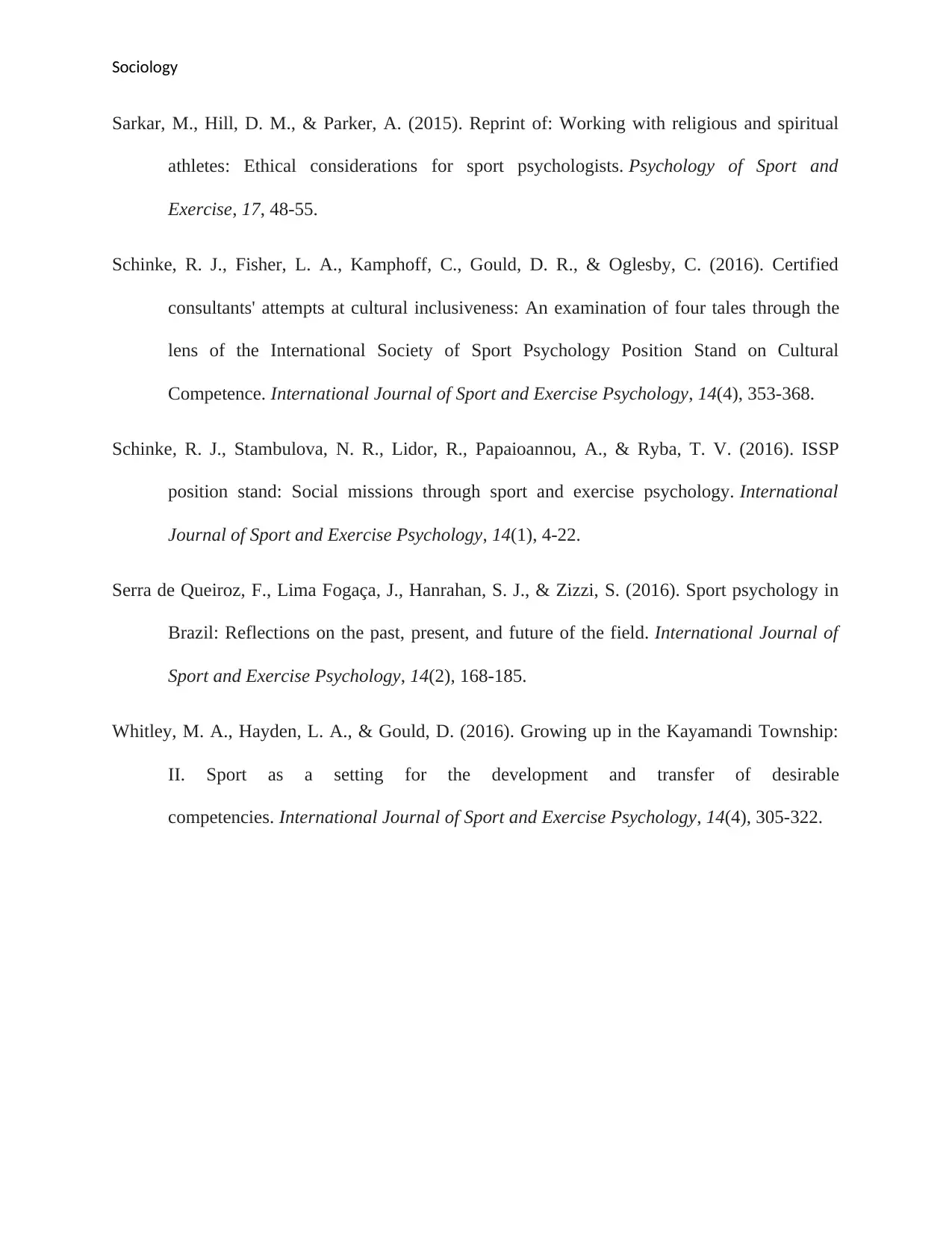
Sociology
Sarkar, M., Hill, D. M., & Parker, A. (2015). Reprint of: Working with religious and spiritual
athletes: Ethical considerations for sport psychologists. Psychology of Sport and
Exercise, 17, 48-55.
Schinke, R. J., Fisher, L. A., Kamphoff, C., Gould, D. R., & Oglesby, C. (2016). Certified
consultants' attempts at cultural inclusiveness: An examination of four tales through the
lens of the International Society of Sport Psychology Position Stand on Cultural
Competence. International Journal of Sport and Exercise Psychology, 14(4), 353-368.
Schinke, R. J., Stambulova, N. R., Lidor, R., Papaioannou, A., & Ryba, T. V. (2016). ISSP
position stand: Social missions through sport and exercise psychology. International
Journal of Sport and Exercise Psychology, 14(1), 4-22.
Serra de Queiroz, F., Lima Fogaça, J., Hanrahan, S. J., & Zizzi, S. (2016). Sport psychology in
Brazil: Reflections on the past, present, and future of the field. International Journal of
Sport and Exercise Psychology, 14(2), 168-185.
Whitley, M. A., Hayden, L. A., & Gould, D. (2016). Growing up in the Kayamandi Township:
II. Sport as a setting for the development and transfer of desirable
competencies. International Journal of Sport and Exercise Psychology, 14(4), 305-322.
Sarkar, M., Hill, D. M., & Parker, A. (2015). Reprint of: Working with religious and spiritual
athletes: Ethical considerations for sport psychologists. Psychology of Sport and
Exercise, 17, 48-55.
Schinke, R. J., Fisher, L. A., Kamphoff, C., Gould, D. R., & Oglesby, C. (2016). Certified
consultants' attempts at cultural inclusiveness: An examination of four tales through the
lens of the International Society of Sport Psychology Position Stand on Cultural
Competence. International Journal of Sport and Exercise Psychology, 14(4), 353-368.
Schinke, R. J., Stambulova, N. R., Lidor, R., Papaioannou, A., & Ryba, T. V. (2016). ISSP
position stand: Social missions through sport and exercise psychology. International
Journal of Sport and Exercise Psychology, 14(1), 4-22.
Serra de Queiroz, F., Lima Fogaça, J., Hanrahan, S. J., & Zizzi, S. (2016). Sport psychology in
Brazil: Reflections on the past, present, and future of the field. International Journal of
Sport and Exercise Psychology, 14(2), 168-185.
Whitley, M. A., Hayden, L. A., & Gould, D. (2016). Growing up in the Kayamandi Township:
II. Sport as a setting for the development and transfer of desirable
competencies. International Journal of Sport and Exercise Psychology, 14(4), 305-322.
⊘ This is a preview!⊘
Do you want full access?
Subscribe today to unlock all pages.

Trusted by 1+ million students worldwide
1 out of 9
Related Documents
Your All-in-One AI-Powered Toolkit for Academic Success.
+13062052269
info@desklib.com
Available 24*7 on WhatsApp / Email
![[object Object]](/_next/static/media/star-bottom.7253800d.svg)
Unlock your academic potential
Copyright © 2020–2026 A2Z Services. All Rights Reserved. Developed and managed by ZUCOL.





